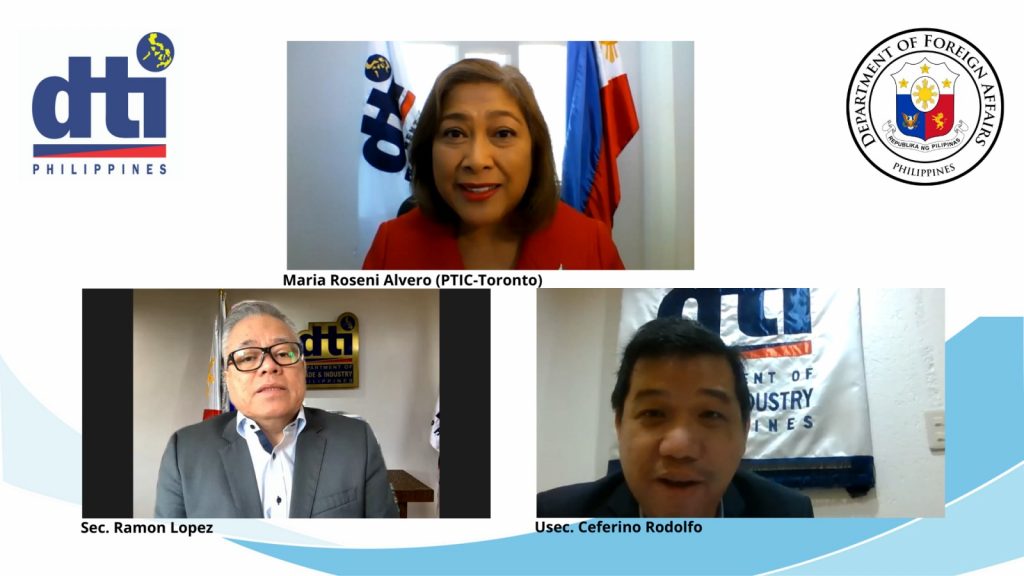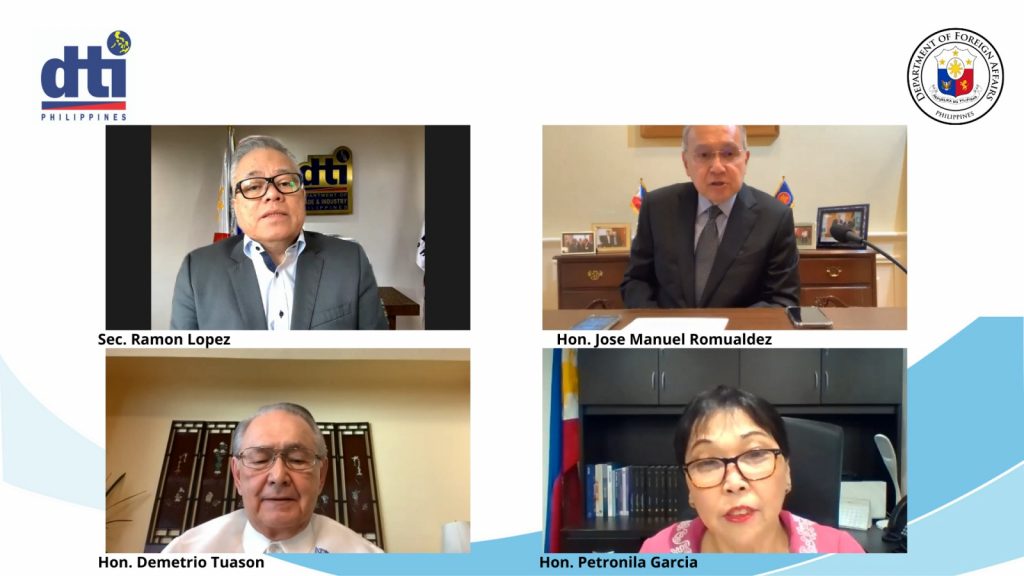Manila, Philippines — Trade Secretary Ramon M. Lopez presented the government’s response to mitigate the effects of COVID-19 on the Philippine economy and its initiatives to lay the groundwork for a new business environment in a webinar entitled “Philippine Business Environment: Post-COVID19,” held on 9 June. Hon. Jose Manuel Romualdez, Petronila Garcia, Demetrio Tuason, Philippine Ambassadors to the United States, Canada, and Mexico respectively, also gave special messages.
Secretary Lopez stressed that despite these challenges, the Philippines is still well-positioned to recover because of its solid macroeconomic and fiscal management. The recent legislation of crucial economic and tax reforms such as the Tax Reform for Acceleration and Inclusion (TRAIN) Law, the Sin Tax Laws of 2019 and 2020, the Rice Tariffication Law, the Universal Health Care Law, and the Ease of Doing Business Law have all helped the Philippines prepare for any crisis.

“Investors are interested in our country because we’re the 2nd fastest growing economy in ASEAN and one of the fastest growing markets in the world. Our people are highly capable, highly trainable, fluent in English, and with cost-competitive talent. Plus, we have a robust electronics and semiconductor industry with strong support industries. Lastly, we have our FTAs and GSPs in several key markets,” he shared.
“The Economist magazine ranked the Philippines 6th among selected emerging economies in the world, and the best among those ranked from Southeast Asia, in terms of financial strength. This shows that the country has gained and continues to enjoy the confidence of the international community, which puts us in a position to finance our COVID-19 response measures sustainably,” he added.

Trade Secretary Lopez also highlighted that even during the imposition of the Enhanced Community Quarantine, the IT-BPO sector remained operational and able to support global clients, particularly the IT-BPOs in healthcare which operated at a high 90% capacity. He also highlighted that the Philippines was one of the few countries that did not impose any restrictions on the export of critical medical products at the height of the COVID-19 pandemic.
He also revealed that one of the key strategies is to position the Philippines as a strategic complementary host country or alternative hub for manufacturing and production facilities, specifically to those looking to diversify their business locations to enhance competitiveness. Secretary Lopez also identified a number of key sectors such as electronics manufacturing, medical devices, and pharmaceuticals as areas where companies in North and South America can look to the Philippines for potential partnerships.
He explained that there is a compelling case for the Philippines to specialize in higher-value manufacturing. A successful core of high value manufacturing requires low cost of capital, access to technology, an educated workforce, and spending on research and development. The Philippines holds a number of key advantages in these sectors, including having a large pool of cost competitive and skilled labor.
During the Q&A session, Secretary Lopez provided updates on the government’s Build Build Build program and shared that many roads, highways, ports, airports, and bridges are being constructed to help lower logistic costs, which is a challenge in an archipelagic country. He stated that while many roads and highways have been inaugurated and airports already upgraded and reopened, there are more logistics-related infrastructure projects expected to be finished in two years before the end of President Duterte’s term. Actual projects include a connector road north of Manila that will bypass the main thoroughfare EDSA scheduled to be finished by December 2020, as well the opening of the last segment of the Tarlac–Pangasinan–La Union Expressway (TPLEX), which is expected to cut short the travel from the end of Manila to La Union from three hours to less than an hour.
When asked about the free trade agreement (FTA) negotiations with the US, Secretary Lopez stressed their committed to pursue FTA discussions. He also mentioned that there is strong interest from the Mexican government to explore bilateral discussions and a potential FTA, since Mexico has historically been a strong trading partner of the Philippines.
The Department of Trade and Industry’s Philippine Trade and Investment Centers in Washington, D.C., New York, San Francisco, Los Angeles, Toronto, and Mexico City, in coordination with the DTI – Foreign Trade Service Corps and the Board of Investments, organised the webinar aimed to reassure the international business community. 338 participants from North America and other parts of the world attended the webinar, while the Facebook Live video garnered over 11,000 views as of this writing.♦
Date of Release: 10 June 2020


